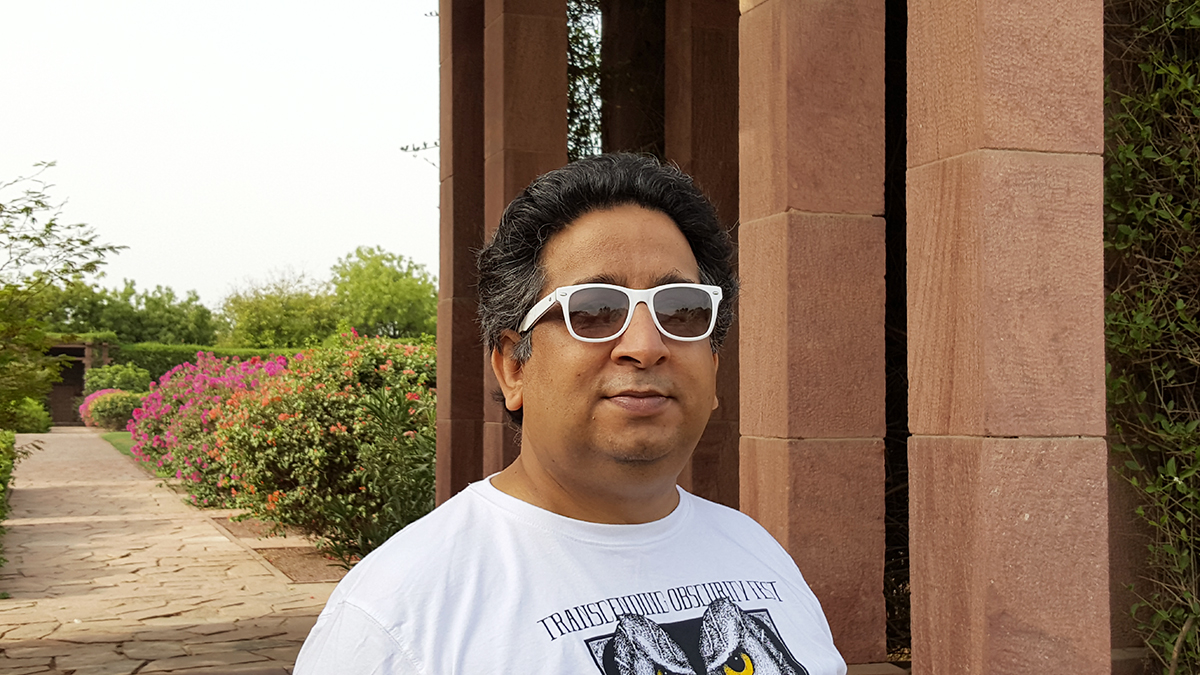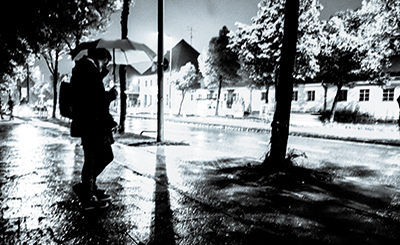
Mustansir Dalvi. Photo courtesy of the poet
Poet’s Note: ‘The appearance of the poem on the page is significant’
I started writing nonsense poetry, in the manner of John Lennon’s In His Own Write and A Spaniard in the Works. Mangling words to convey ideas in slant, it was important to present my poems on the page in as conventional manner as possible, so readers are thrown on reading the poems.
At the time there were no readers, only myself. The appearance of the poem on the page has remained significant for me ever since. Although I no longer write poetry like I once did, there is a certain lawlessness that has carried on, like an after-image. My moment of epiphany for my writing was reading Arun Kolatkar’s Jejuri for the first time. I found freedom there — both in terms of form as well as what one can write about.
There has never been a settled time in what is generally called a ‘poetic practice’ that I can talk about with reasonable objectivity. What has changed is that my poems now have an audience. Some even say nice things about them. Writing has never been easy; I struggle with long bouts of nothingness and squeeze out poems like the last bit of toothpaste in a tube. I can’t say that I am comfortable with this, but this is what it is for the present.
One of the sheet-anchors in my ragged ‘practice’ has been translation. Urdu, Marathi, Gujarati, others. Rahim, Mirza Ghalib, Muhammad Iqbal, Faiz Ahmed Faiz, Arun Kolatkar, Hemant Divate, Manya Joshi, Dinkar Manwar, Udayan Thakkar, others. Translating their poems has provided succor and some discipline. I am ever grateful to all the poets that I have translated. Once again, there is little method in my choice-making, just the pleasure of words in another language that I feel the special need to wrestle with, hearing them transform in English, looking at them side by side.
False Memory
Late afternoon. First Class window seat.
A man enters, looks around. Leaves.
Then another man. Then another.
On the seat, a knitted, white skull-cap.
One more sees. Balks, vacillates, then
removes himself to an away corner.
Stares turn into glares. Each chooses
distance from this object left behind.
Dawdling,
dithering,
wavering,
flinching,
shilly-shallying,
hemming and hawing,
the seats fill,
all but one.
Wheels turn. The last man standing
mulls over the gap. With two fingers,
picks the cap, tucks it away
into the flap of the seat.
In mutual sleep-inducing rhythms,
burbling breath and half snores,
all this is slowly let go, recycled
into a collective bin of false memory.
Geodesic
The shortest distance between two points —
the line between us is a length of string,
pulled taut. The flight of a crow. A point,
vanishing to an arrowhead that I wish,
like cupid, pierces you in geodesic frugality.
You touch your breast, unprompted,
and think of me. I, like Majnoon,
walk on rails with bare feet,
putting my trust in GPS to pick tracks
that would link the stations of our hearts.
(from Walk, Yavanika Press, 2020)
Nightwalkers
Nightwalkers glide through Tier III towns.
Zephyrs susurrate through streets,
rise to murmurations, then fall silent.
Rivulets meet, break, tumescent,
quicksilver, never reaching a momentum
that would lead to deluge.
No hive mind this, everyone
remains the nayak of their own story.
The desire for relief is a bucket of cold water
poured over every glowing ember of revolution.
(from Walk, Yavanika Press, 2020)
Dump
Petition editors, signature campaigners accumulate evidence in the betweens of a city going to the dogs, as
assiduously as a refuse bin repels garbage. Each sense organ appropriates part of the cogitation after every
mess you cannot but step into. Every house-gully is re-envisioned full fifty times digitally and you spend
twenty-five nights photoshopping its pungent tinctures to satisfaction. May your dreams make vivid the reek
of your sleeping body; make it mumble the parsel tongue of your own stench brought home from waking life.
of your sleeping body; make it mumble the parsel tongue of your own stench brought home from waking life.
Can’t turn away from the smell, can you? Nor avert your gaze from the United Colours of putrefying waste?
The only fulfillment is in the fetishism of throbbing thrash.
The essay and the poems are part of our Poetry Special Issue (January 2021), curated by Shireen Quadri and Nawaid Anjum. © The Punch Magazine. No part of this essay or the new poems exclusively featured here should be reproduced anywhere without the prior permission of The Punch Magazine.
Comments
*Comments will be moderated











